When it comes to higher education in Virginia, you won’t have to settle. Policymakers in the nation’s birthplace recognize the role education has in the state’s overall success.

The Virginia Business Higher Education Council launched Growth4VA to promote and reinvest in the state’s higher education system, prioritizing access and affordability.
Editorial Listing ShortCode:
Virginia already has a lot to offer, but the state continues to seek improvement which demonstrates a true dedication to education.
Online Colleges in Virginia

Online learning has increased in popularity, as more and more individuals seek a way to pursue a degree or certification while still maintaining their career, family life, and other obligations.
The National Center for Education Statistics (NCES) reported that 34.7% of Virginia’s undergraduate students were enrolled exclusively in online programs, and another 28% were participating in a hybrid of online and on-campus courses. These percentages continue to rise as schools increase their online course offerings.
Editorial Listing ShortCode:
Universities within the state offer various bachelor’s degrees as well as numerous undergraduate and graduate certificates with some colleges more than 50 fully online and hybrid degree and certificate programs in popular fields like business, education, engineering, and health.
You can also find online courses at some of the state’s prestigious colleges including master’s degree programs online like Ocean Engineering, Natural Resources, Political Science, Information Technology, and more. Some online universities in Virginia even have fully online and hybrid degree programs available in their business school, school of education, and law school among others.
Those interested in earning an associate degree or certification should consider Virginia community colleges, where they will find a truly remarkable range of fields they can pursue online.
Common Online Degrees in Virginia

You can pursue a broad range of online degrees in VA, but many students major in these popular areas:
- Registered Nursing: In Virginia, you must earn an associate’s or bachelor’s degree in nursing and pass the NCLEX-RN exam to become a registered nurse. Students who major in registered nursing study foundational medical subjects like anatomy, behavioral health, and pharmacology.
- Psychology: This degree explores functions and disorders of the human mind. Many online colleges allow students to specialize in a subfield, such as behavioral psychology, educational psychology, or organizational psychology.
- Computer and Information Systems Security: This major focuses on strategies to protect computer and information systems from cybercrimes and other threats. Online CISS programs often include courses on database management, information assurance and security, and network administration.
- Health Care Administration: This degree blends business and medicine to prepare students for leadership positions in healthcare systems. Students study topics like ethics, healthcare finance, and strategic planning.
- Business Management: This major trains students for management positions in business organizations. The degree typically covers subjects like accounting, marketing, and supply chain management.
Common online degrees often attract students who want more job opportunities or fulfilling career paths.
Overview of Higher Education in Virginia

Virginia is home to 115 degree-granting institutions, including a number of accredited online colleges, according to the NCES. Of these, 41 are public schools, 42 are non-profit private schools, and 32 are for-profit private schools.
The average cost for in-state residents to attend one of Virginia’s 4-year public institutions is $13,655, according to the NCES. Out-of-state students will pay around $36,193. Both tuition rates are thousands of dollars above the national average.
Editorial Listing ShortCode:
Virginia residents who are unable to find their degree programs at in-state schools can benefit from the state’s involvement in the Southern Regional Education Board (SREB). The program allows students to enroll at public schools in the other 15 participating states while paying in-state tuition rates.
Employment Outlook for College Graduates in Virginia

Overall, the employment outlook for online college graduates in Virginia is positive. The Virginia Employment Commission predicts that the number of jobs in the state will increase by 10% over the next 10 years. As a result, students may find plentiful career opportunities.
Additionally, Virginia has a low unemployment rate. The Bureau of Labor Statistics (BLS) reports that 3.2% of Virginia residents were unemployed. This rate was slightly lower than the national average of 3.5% for that month. According to the BLS, the fastest-growing industry in Virginia is leisure and hospitality. The number of employees in this sector has increased by 6.3%.
Other expanding industries include education and health services (5.3% growth), information (2.6%), and professional and business services (2.3%). Pursuing a career in one of these areas could lead to more plentiful job options.
Careers & Salaries in Virginia
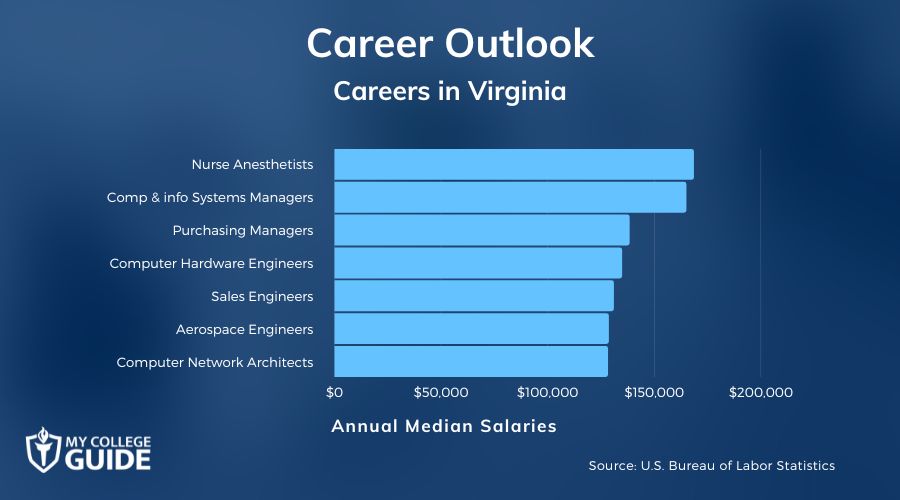
Virginia is home to many diverse and thriving industries. According to the Virginia Economic Development Partnership, the state’s most prominent sectors include:
- Agriculture
- Aerospace
- Cybersecurity
- Data centers
- Healthcare
- Offshore wind
- Semiconductors
- Software
- Supply chain management
Many of these industries can lead to well-paying careers. Based on data from the Bureau of Labor Statistics, here are 10 potential jobs and their median salaries in Virginia.
| Careers | Annual Median Salaries |
| Nurse Anesthetists | $168,440 |
| Computer and Information Systems Managers | $164,920 |
| Purchasing Managers | $138,300 |
| Computer Hardware Engineers | $134,780 |
| Sales Engineers | $130,920 |
| Aerospace Engineers | $128,560 |
| Computer Network Architects | $128,170 |
| Computer and Information Research Scientists | $127,380 |
| Information Security Analysts | $126,240 |
| Industrial Production Managers | $119,680 |
These are only a few of the many positions that students may qualify for after receiving degrees from online colleges and universities in Virginia. Some of these careers require additional education or work experience beyond a bachelor’s degree.
For example, nurse anesthetists must hold a master’s degree and pass the National Certification Exam. Similarly, many employers require industrial production managers to have at least 5 years of work experience in a similar role.
Keep in mind that no degree or skill set can guarantee a specific career outcome. Many factors influence career paths, including the economy, job availability, region, and work experience.
Should I Study in Virginia?

Online education allows students to enroll in colleges and universities across the country without ever leaving their homes.
With so many schools and states to choose from, you may wonder if going to a Virginia university online is the right fit for you. The process of choosing a college and state is highly subjective, but here are a few signs that you may enjoy studying in Virginia:
- You’re a Virginia resident: Typically, colleges and universities have lower tuition rates for in-state students. If you already live in Virginia, enrolling in a program in the state may be more affordable than opting for an out-of-state school.
- You want to enroll in an unusual major: Most online schools offer popular majors like business management and English, but finding online programs for more unique degrees can be challenging. Online universities in VA have over 100 majors, so you have plenty of options.
- You hope to get a job in Virginia: Employers in the state may look more favorably at job candidates with online Virginia degrees, especially if they graduated from the same school.
If you fall into one of these categories, consider studying in Virginia.
Online Virginia Colleges Admissions Requirements

Colleges consider numerous factors when making admissions decisions. Criteria vary among schools, but here are a few materials you may need to submit:
- ACT or SAT scores (not required at all schools)
- Letters of recommendation
- A personal essay discussing your career goals, a learning experience, or other subjects
- Transcripts from your high school and any post-secondary institutions you’ve attended
Plus, some colleges require students to complete placement exams in English and math.
Online VA Colleges Accreditation
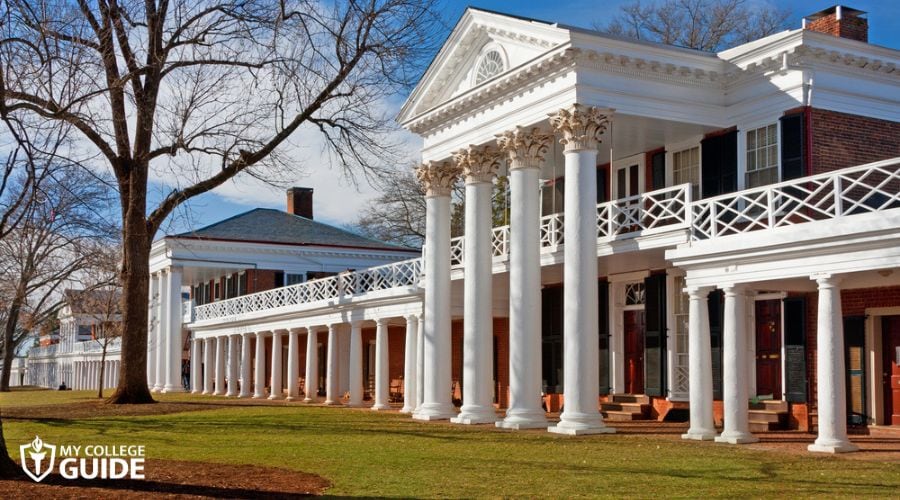
As you research degree programs, consider focusing on regionally accredited online universities in Virginia. Institutions must pass a strict evaluation by an outside authority to receive accreditation. In Virginia, many schools earn regional accreditation from the Southern Association of Colleges and Schools Commission on Colleges.
Accreditation guarantees that a school provides a high-quality education. These institutions frequently offer a broad range of student support services, like tutoring centers and libraries. Also, students who attend accredited schools may be eligible for financial aid options like federal grants and student loans.
Financial Aid and Scholarships
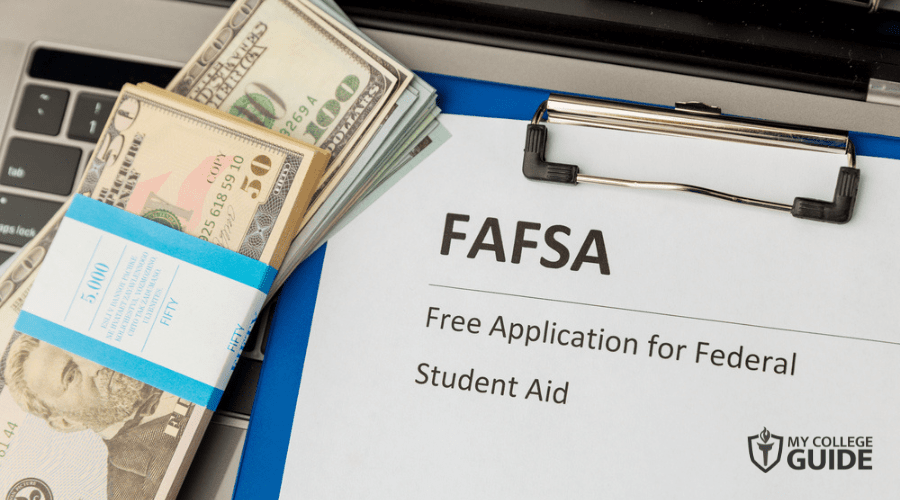
If you are thinking about attending one of the many online colleges in VA, you will need to complete the Free Application for Federal Student Aid (FAFSA). This can provide you access to federal, state, and private financial aid.
Grants and scholarships are the best form of aid since they do not have to be repaid. In Virginia, the State Council of Higher Education for Virginia (SCHEV) advocates for quality, accessibility, affordability, and accountability in higher education.
They administer financial aid programs such as the following:
- Two-Year College Transfer Grant: This program is for students transferring from a 2-year school to an eligible 4-year school. You must demonstrate financial need and have a GPA of 3.0 or higher.
- Virginia Commonwealth Award Program: Need-based aid at public schools; Amount varies
- Virginia Guaranteed Assistance Program: This is a merit and need-based aid prgoram offered at public schools. Students must have graduated with a GPA of 2.5 or higher, and maintain a GPA of 2.0 or higher in college.
- Virginia Military Survivors and Dependents Education Program: This program is intended for a spouse or child of a military service member who was killed or suffered a total and permanent disability while serving active duty.
There are also a number of undergraduates and graduate financial aid programs for those with specific circumstances and those going into specific degree fields. Private scholarships are another way to help offset the cost of college.
Here are some examples of scholarships open to students in Virginia:
- Charles Homer Barton Scholarship: (5) $4,000
- Leo Bourassa Scholarship Announcement: (multiple) $500-3,000
- Rich Murray Journalism Scholarship: $1,000
- The Granville P. Meade Scholarship: $2,000 per year
It can be a good idea to talk to someone in the financial aid office at the school you have chosen. They may be able to tell you about any additional financial aid programs available to students.
Virginia Online Education Resources

Many organizations have created free online resources to increase access to online colleges and universities in Virginia, such as:
- The Virginia Network: This nonprofit initiative promotes female leadership in higher education and provides resources for women interested in academic careers.
- Virginia Education Wizard: This website has a 10-minute career assessment, financial aid resources, and a searchable database of two- and four-year colleges in Virginia.
- Virginia Latino Higher Education Network: This organization organizes outreach programs and offers scholarships for Latino students who attend Virginia colleges.
These convenient resources can help you learn more about educational opportunities in Virginia.
How Much Does It Cost to Go to an Online College in Virginia?

Tuition costs in Virginia can vary dramatically based on the type of school, your location, and other factors. For example, students who attend Virginia community colleges online usually pay less than those who attend private four-year universities.
Based on data from the National Center for Education Statistics, here’s a quick breakdown of average tuition costs for Virginia college students:
- Public 4-year colleges: $13,931 for in-state students and $36,193 for out-of-state
- 2-year community colleges: $5,228 for in-state and $12,059 for out-of-state
It’s beneficial to research each Virginia online university and the costs associated before applying.
Tuition Breaks for Out-of-State Students

If you’re an out-of-state student who wants to attend a Virginia university online, you may qualify for a tuition break. Virginia is one of 15 states that have joined the Southern Regional Education Board (SREB). This organization offers the Academic Common Market (ACM), a tuition reciprocity program.
The ACM is an agreement between SREB states that allows out-of-state students to pay in-state tuition rates at certain public universities. This discount only applies to students who enroll in programs not offered in their home state. Also, students must complete an application with SREB to qualify.
What Jobs Are in Demand in Virginia?

As Virginia’s economy grows, the demand for many entry-level jobs has soared. According to the Virginia Employment Commission, here are 5 careers that will experience rapid growth over the next 10 years:
- Tire Builder: 93% predicted job growth
- Motion Picture Projectionist: 59%
- Cooks, Restaurants: 50%
- Solar Photovoltaic Installers: 48%
- Fitness Trainers and Aerobics Instructors: 47%
If you graduate from a Virginia college online and you want to work in one of these trendy roles may have ample career prospects in the next few years.
What Are the Highest Paying Jobs in Virginia?
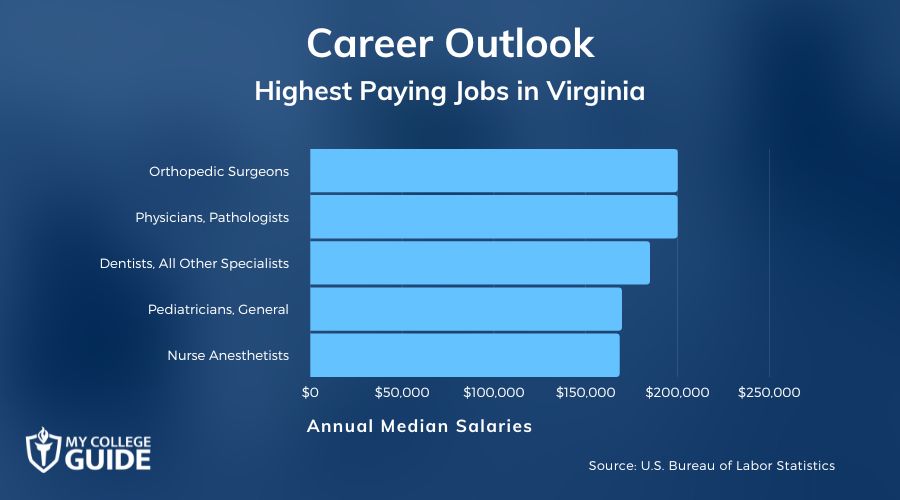
Many professionals secure well-paying positions in Virginia. According to the Bureau of Labor Statistics, here are the 5 highest-paying jobs in the state and their median annual salaries:
- Orthopedic Surgeons, Except Pediatric: $200,033.6
- Physicians, Pathologists: $199,992
- Dentists, All Other Specialists: $184,932.8
- Pediatricians, General: $169,665.6
- Nurse Anesthetists: $168,438.4
As this list illustrates, healthcare careers may command lucrative salaries in Virginia. However, all the top-paying positions require a medical or master’s degree, along with clinical experience. If you’re passionate about helping people and want to pursue additional schooling, you can consider these career paths.
List of Online Colleges in Virginia
Methodology: The following school list is in alphabetical order. To be included, a college or university must be regionally accredited and offer degree programs online or in a hybrid format.

Averett University offers online degree programs that include studies in business, data analytics, criminal justice, sociology, psychology, education, nursing, and leadership. The option is commonly offered to earn any of these degrees in a hybrid format with some classes on campus, or to choose a traditional program and take some classes online.
Averett University is accredited by the Southern Association of Colleges and Schools Commission on Colleges.

Bluefield University offers online bachelor’s degree programs. Potential areas of study include business administration, criminal justice, cybersecurity, early childhood education, elementary education, ministry leadership, nursing (RN to BSN), and psychology and human services. Bluefield aims to provide its students with a Christ-centered learning community. Classes are typically 8 weeks long each.
Bluefield University is accredited by the Southern Association of Colleges and Schools Commission on Colleges.

East Coast Polytechnic Institute University offers fully online programs to earn a bachelor’s degree in about 3 years or an associate’s degree in an average of 18 months. Common programs include cybersecurity, mechanical engineering technology, RN to BSN, healthcare administration, business analytics, IT management, and more.
ECPI University is accredited by the Commission on Colleges of the Southern Association of Colleges and Schools.

Eastern Mennonite University offers a variety of degree, diploma, and certificate programs online, at both the undergraduate and graduate levels. Options for undergraduate majors include Leadership and the graduate options are Doctor of Nursing Practice, MA in Christian Leadership, MA in Human Resources, MA in Organizational Leadership, and more.
Eastern Mennonite University is accredited by the Southern Association of Colleges and Schools Commission on Colleges.

George Mason University offers online undergraduate programs. Popular areas of study include information technology, sport management, health administration, economics, computational and data sciences, and more. Courses may be offered in a synchronous or asynchronous format. The option to take hybrid online courses that include some face-to-face meetings may be available.
George Mason University is accredited by the Southern Association of Colleges and Schools Commission on Colleges.

Hampton University offers a variety of online degree programs at both the undergraduate and graduate levels. Possible majors include general studies, religious studies, nursing, public safety administration, systems organization and management, criminal justice, business management, paralegal legal studies, or aviation management (airport administration).
Hampton University is accredited by the Southern Association of Colleges and Schools Commission on Colleges.

James Madison University offers online graduate and undergraduate degree programs. One option is an online Bachelor of Individualized Study for adult learners who already have some college credit. Another option is an online BSN program for Registered Nurses. The university also offers an on-campus degree program with the option to take some courses online.
James Madison University is accredited by the Southern Association of Colleges and Schools Commission on Colleges.

Liberty University offers over 800 online programs, including associate’s, bachelor’s, master’s, and doctoral degrees, as well as career certificates at every level. Possible majors for online bachelor’s degrees include information systems, criminal justice, strategic intelligence, political science, cultural engagement, law and policy, human services, and more.
Liberty University is accredited by the Southern Association of Colleges and Schools Commission on Colleges.

Mary Baldwin University offers online bachelor’s degree programs. Possible areas of study include autism studies, business, criminal justice, English, history, liberal arts, marketing and communication, nursing (RN to BSN), psychology, social work, sociology, and special education. Applications are generally accepted year round.
Mary Baldwin University is accredited by the Southern Association of Colleges and Schools Commission on Colleges.

Marymount University offers online BSN, MSN, and DNP programs for those who already hold RN licensure, as well as online programs to earn a Doctor of Education or a Doctor of Business Administration. Assistance in finding sites for clinical placement is typically offered as part of the nursing program.
Marymount University is accredited by the Southern Association of Colleges and Schools Commission on Colleges.

Norfolk State University offers fully online bachelor’s degree programs. Options may include history, psychology, interdisciplinary studies, business, information management, tourism and hospitality management, health services management, and RN to BSN. Classes tend to be student-centered and are typically taught by experienced faculty. Programs use low-cost digital materials in an effort to keep tuition lower.
Norfolk State University is accredited by the Southern Association of Colleges and Schools Commission on Colleges.

Old Dominion University offers online degree programs designed with the flexibility to be compatible with a busy work or life schedule. Bachelor’s degree options include computer science, health services administration, management, risk management and insurance, business administration, computer engineering, political science, accounting, business analytics, and more.
Old Dominion University is accredited by the Southern Association of Colleges and Schools Commission on Colleges.

Radford University offers online bachelor’s degree programs. Popular majors include business administration, economics, security software development, emergency services, health sciences, healthcare administration, public health, and RN-to-BSN.
Most programs are degree completion programs designed for adults who already have some college credit. Radford also offers online career certificates and graduate degree programs.
Radford University is accredited by the Southern Association of Colleges and Schools Commission on Colleges.

Regent University offers over 150 online programs. Majors may include bachelor’s degree options in biblical and theological studies, Christian ministry, communication studies, English, government, history, law and national security, leadership studies, accounting, and business. Classes are typically faith-based and generally last about 8 weeks each. Programs are designed to be flexible to fit with busy work schedules.
Regent University is accredited by the Southern Association of Colleges and Schools Commission on Colleges.

Shenandoah University offers an online RN to BSN program, as well as online master’s degrees in areas such as applied behavior analysis, nursing, public health, business administration, educational administration, and performing arts leadership and management. Graduate level career certificates are also available in fields such as digital marketing, cybersecurity management, applied behavior analysis, and more.
Shenandoah University is accredited by the Southern Association of Colleges and Schools Commission on Colleges.

The University of Virginia offers a Bachelor of Interdisciplinary Studies and a Bachelor of Professional Studies in Health Management online. A Master of Public Safety online program is available as a graduate degree. Online classes at UVA are designed to provide a collaborative learning environment with a diverse community of students.
The University of Virginia is accredited by the Southern Association of Colleges and Schools Commission on Colleges.

Virginia Commonwealth University offers fully online bachelor’s degree programs in accounting, RN to BSN, marketing, and mass communications with a concentration in either Advertising or Public Relations. VCU also offers an online BS in Medical Laboratory Sciences that includes learning through video conferencing. At the graduate level, there are degree options in education, social work, sociology, and more.
Virginia Commonwealth University is accredited by the Southern Association of Colleges and Schools Commission on Colleges.

Virginia State University offers online degree programs such as a BS in Hospitality Management and an RN to BSN degree program. At the graduate level, a Master of Education in Special Education and a Doctorate of Education in Educational Administration and Supervision is also offered. VSU’s online programs are designed to meet the needs of working professionals.
Virginia State University is accredited by the Southern Association of Colleges and Schools Commission on Colleges.
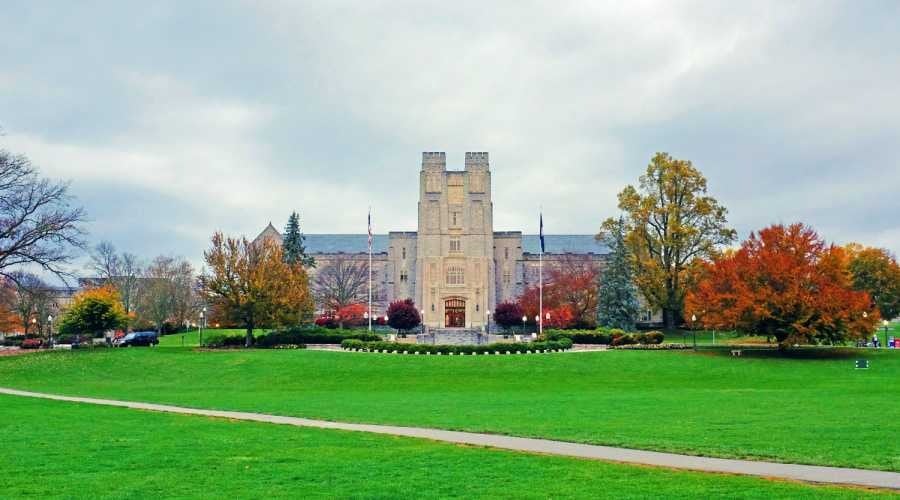
Virginia Tech offers online master’s degree programs. Popular majors include mechanical engineering, business administration, agricultural and applied economics, aerospace engineering, public administration, natural resources, political science, and life sciences. Curricula are designed to teach real-world, job-oriented skills aimed at helping meet career goals.
Virginia Tech is accredited by the Southern Association of Colleges and Schools Commission on Colleges.

Virginia Wesleyan University offers online degree programs designed to provide flexibility compatible with full-time jobs or other commitments. Possible majors for bachelor’s degree programs include business, criminal justice, music production, environmental studies, management information systems, psychology, social science, sociology, liberal studies, and sustainability management.
Virginia Wesleyan University is accredited by the Southern Association of Colleges and Schools Commission on Colleges.
Getting Your Online Degree in Virginia

You won’t have to settle in Virginia. The state has great things to offer its students including high-ranking colleges and universities, a diverse range of online programs, and generous financial aid programs.
When you’re ready to take the next step in your educational journey, you may want to consider researching accredited online schools in Virginia that offer your chosen degree program.
You can also view our Online Colleges in Vermont and Online Colleges in Washington guides for more options.
